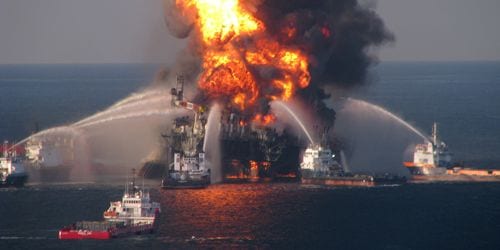
Everywhere they operate, something bad happens.
— Eva Rowe
“The trailer started shaking real violent,” remembers Dave Leining. A 36-year veteran worker at BP’s Texas City oil refinery in 2005, Leining and a number of associates were gathered to discuss safety concerns when the facility erupted. “The force of the blast knocked me down to the ground,” he goes on, “and then you could see a big ball of fire roll over our heads, right over the trailer. It just got real quiet. It got real dark. I figured, you know, that’s the end.”
It wasn’t the end for Leining, who, unlike 15 other victims that day, survived (he lost his hearing and broke both ankles). He describes his experience for The Spill, a joint investigation by Frontline and ProPublica premiering this week on PBS. He stops there, according to the nondisclosure terms of his and other victims’ $1 billion-plus settlement with BP, and does not detail what went wrong at the plant, for instance, “an antiquated blow-down stack, nonworking alarms and other outdated equipment,” as reported in the Houston Chronicle. As safety engineer Mike Sawyer says, “It was typical for them to experience a fire every week on average. A fire every week is a warning sign that something is critically wrong at the facility. It was the worst refinery around this area, for sure.”
Frontline‘s Martin Smith speaks with the one victim who did not sign the agreement, Eva Rowe, who lost both her parents at the Texas City plant. “This was not an accident,” she says. “This was profits over people.” Rowe fought BP in court for a year and a half, finally winning an undisclosed amount of money, $32 million in donations to charities of her choice, and the release of some seven million internal documents that were used in government investigations of the explosion. These resulted in BP paying another $71 million in fines, but not one official was ever charged with a crime.
The Spill argues that such payments are yet another way that BP has found to cut costs. Fast buying up other companies (Britoil, Amoco, ARCO, and Burmah-Castro), BP expanded beyond its management capacity. Faulty facilities were left to rust and break down, and the company continued paying fines rather than maintaining and updating equipment or following edicts from inspectors. According to Michael Theurich, who inspected the company’s Prudhoe Bay oilfield pipelines in 2006, “It’s kind of like a crap shoot, as far as, are you going to find some damage or not?” Following two spills March and August of 2006, the U.S. government sued BP for “failing “to prepare and implement spill prevention.” The company pleaded guilty to a misdemeanor, paid a $20 million fine, and persisted with dangerous practices despite promises to adhere to industry and government standards.
As The Spill reports, the Texas City and Prudhoe Bay incidents were among a “series of closely spaced accidents,” which, along with a public scandal, led to the ouster of CEO Lord John Browne in 2007. But the problems were systemic, part of an internal culture. His replacement, the “well regarded engineer” Tony Hayward, appears here describing the problem he promises to fix, to a group of students at Stanford: the corporation has been “too top down, too directive, and not good at listening.”
Despite promises to change that culture, Hayward now appears to have done precious little except follow in-place protocols. And, as the U.S. government encouraged oil companies to pursue deep water “opportunities,” BP was quick to take advantage. Carola Hoyos, energy correspondent for the Financial Times in London, assesses, “BP was the kid in the front of the class, putting up its hand before it even had an answer, basically.” And again, The Spill submits, that attitude, combined with the government’s lack of enforcements regarding violations, allowed BP to continue to cut corners all the way to the Deepwater Horizon rig.
During his interviews with Carol Browner, the director of the White House Office of Energy and Climate Change Policy, and then David Hayes, Deputy Secretary of the Interior, Smith runs into answers that might as well be dictated by nondisclosure agreements. “At what point does the safety and environmental record of a company rise to an issue of concern for the White House?” asks Smith. Both officials assert that the White House isn’t responsible for vetting specific companies, only to lay out the general policy (say, deep water drilling will be expanded, as President Obama announced just 20 days before the Deepwater Horizon rig exploded in the Gulf of Mexico).
Moreover, says David Uhlmann, a longtime prosecutor of environmental crimes, the laws “have no teeth.” Even when BP breaks laws, it can get away with just paying fines and then returning to work as usual. In other words, as much as BP has been responsible for cheating and ignoring real dangers at its facilities, it has operated within boundaries ordained — implicitly or explicitly– by the government and the industry. And, as good as it might be to punish BP for what it’s done, it is also important to understand it is as much a symptom as a cause.

![Call for Papers: All Things Reconsidered [MUSIC] May-August 2024](https://www.popmatters.com/wp-content/uploads/2024/04/all-things-reconsidered-call-music-may-2024-720x380.jpg)



